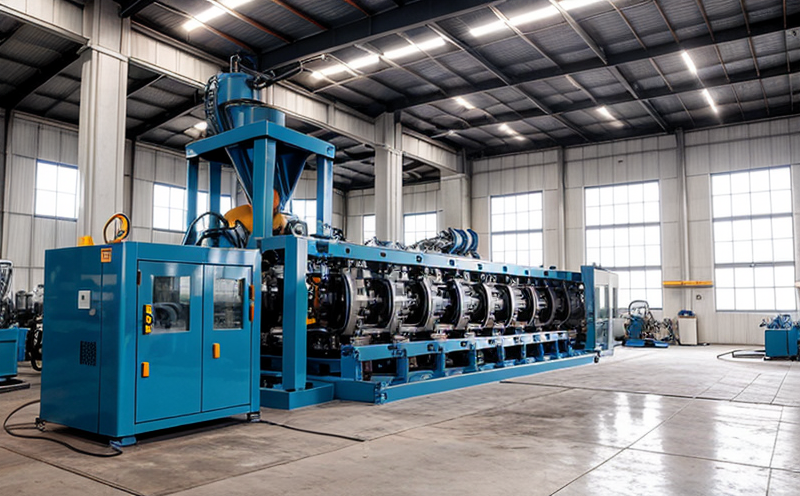ISO 5003 Hydraulic Press Performance Testing
The ISO 5003 hydraulic press performance testing is a critical component of industrial manufacturing and processing, ensuring that machinery and equipment meet the highest standards of reliability and durability. This test evaluates the load-bearing capacity, stability, and operational efficiency of hydraulic presses used in various industries such as automotive, aerospace, and construction. Compliance with ISO 5003 ensures that manufacturers can provide products that are not only reliable but also safe for use.
The testing process involves subjecting the hydraulic press to a series of mechanical loads under controlled environmental conditions. This helps in identifying potential weaknesses or issues before they become operational problems, leading to better product quality and safety. The test is conducted using specialized equipment that simulates real-world operating conditions, ensuring accurate results.
For industrial applications, this testing ensures the following:
- Load capacity verification
- Operational stability under stress
- Energy efficiency during operation
- Elongation and deformation behavior
The results of ISO 5003 testing provide detailed reports that include load vs. deflection curves, stress-strain relationships, and other performance metrics. These data points help quality managers make informed decisions about equipment upgrades or replacements, thereby enhancing overall productivity and reducing downtime.
By adhering to international standards like ISO 5003, manufacturers can ensure their products meet global regulatory requirements, opening up markets in countries that demand compliance with these specifications. This not only enhances brand reputation but also fosters trust among customers who value reliability and safety in the equipment they purchase.
In summary, ISO 5003 hydraulic press performance testing is essential for maintaining high standards of quality control within industrial manufacturing processes. It plays a pivotal role in ensuring that every piece of machinery meets stringent performance criteria, thereby contributing significantly to operational efficiency and customer satisfaction.
Industry Applications
The ISO 5003 hydraulic press performance test is widely used across various sectors where heavy-duty presses are crucial for manufacturing processes. Key industries include automotive, aerospace, construction, and engineering. In the automotive sector, these presses are essential for stamping and forming metal components such as car frames and body panels. In aerospace, they play a vital role in the production of complex parts like engine casings and landing gear.
For the construction industry, hydraulic presses ensure that large structures undergo rigorous testing before deployment, ensuring structural integrity and safety. Engineering firms often use these tests to validate new designs or modifications to existing equipment, helping them stay ahead of technological advancements while maintaining compliance with international standards.
The test is particularly beneficial for R&D teams looking to innovate within their respective fields by providing reliable data on the performance capabilities of newly developed machinery. This information allows engineers and scientists to refine prototypes until they meet all necessary specifications before full-scale production begins.
Moreover, compliance officers find value in this testing process as it helps maintain regulatory standards set forth by governing bodies worldwide. By ensuring that hydraulic presses adhere strictly to ISO 5003 guidelines, companies demonstrate their commitment to safety and quality assurance practices which can be crucial for maintaining certifications and licenses required in international markets.
Quality and Reliability Assurance
The quality and reliability of hydraulic presses are paramount in industries reliant on heavy-duty equipment. ISO 5003 testing ensures that these machines perform consistently under various conditions, thereby enhancing overall production efficiency.
- Load Capacity Verification: The test verifies the maximum load capacity of the press, ensuring it can handle the heaviest materials without failure.
- Operational Stability Under Stress: This aspect evaluates how well the machine holds its position under high loads or sudden impacts, preventing any unwanted movement that could affect product quality.
- Elongation and Deformation Behavior: By measuring elongation during loading cycles, this test identifies potential weaknesses in materials used in press construction. It also helps assess whether components will deform beyond acceptable limits when subjected to extreme conditions.
The detailed reports generated from these tests provide valuable insights into the performance characteristics of hydraulic presses. These data points enable manufacturers to identify areas for improvement and implement necessary changes before finalizing designs or releasing products to market.
Additionally, ISO 5003 testing contributes significantly towards maintaining compliance with international standards such as ISO and ASTM, which are recognized globally. This ensures that the equipment meets not only local but also international regulatory requirements, broadening access to diverse markets without compromising on quality assurance processes.
Environmental and Sustainability Contributions
The ISO 5003 hydraulic press performance testing contributes positively towards environmental sustainability by promoting efficient use of resources. By ensuring that presses operate efficiently under optimal conditions, this testing helps minimize energy consumption during production processes.
In the automotive industry, for example, accurate testing ensures that components are manufactured precisely according to specifications, reducing waste and scrap rates. This leads to lower material costs and less environmental impact associated with unnecessary rework or disposal of defective parts.
The test also promotes sustainable practices by encouraging manufacturers to design equipment with durability in mind. When presses are built to last longer due to robust testing procedures, fewer replacements are needed over time, extending the lifecycle of each unit and reducing waste generation within manufacturing operations.
Furthermore, compliance with ISO 5003 standards fosters responsible resource management practices throughout supply chains involved in producing hydraulic presses and associated components. This includes sourcing raw materials responsibly while minimizing adverse impacts on ecosystems during extraction or processing stages.
In conclusion, ISO 5003 hydraulic press performance testing plays a crucial role in enhancing both product quality and environmental sustainability within industrial manufacturing processes. Through rigorous evaluation of key performance indicators, this test supports sustainable development goals by encouraging efficient resource utilization and responsible production practices across industries.





